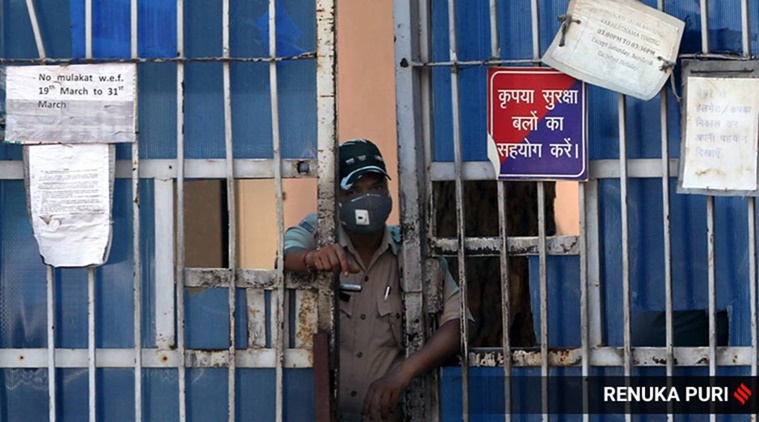 Four inmates have succumbed to the infection till now, two in Taloja Central Prison and one each in Yerawada and Dhule Prison. (Representational Image)
Four inmates have succumbed to the infection till now, two in Taloja Central Prison and one each in Yerawada and Dhule Prison. (Representational Image)
As many as 10 prisons across Maharashtra have reported coronavirus disease (Covid-19) cases, with 292 inmates and 72 prison staff testing positive for the infection. As per the data available till Monday, 139 inmates and 51 prison staff have recovered.
The maximum number of positive cases are from Mumbai Central Prison, better known as Arthur Road Jail, where 181 inmates and 39 staff have been infected till now, of whom 121 inmates and 37 staff have recovered.
The second highest number of cases is from Solapur prison, where 62 inmates and 13 staff members have tested positive, followed by Aurangabad Prison, where 29 inmates and 14 staffers have tested positive. While cases in Arthur Road Jail were reported in the first week of May, cases in Solapur and Aurangabad prisons were reported in the last week of May and the first week of June, respectively.
Extensive screening and testing has been done in prisons where cases have been reported, said officials.
Four inmates have succumbed to the infection till now, two in Taloja Central Prison and one each in Yerawada and Dhule Prison. The Yerawada Central Prison in Pune, which has the highest population of inmates in the state, has not reported any case till now other than one inmate who was isolated following breathing problems, and whose sample tested positive after his death.
The aymtomatic Covid-positive inmates are being isolated in separate care facilities or temporary prisons set up for the inmates, while those with symptoms are being provided treatment at hospitals, said officials. Several additional measures have also been initiated — including complete lockdown of some prisons, not allowing any visitors and additional phone call hours to them – to prevent the spread of infection.
One of the key measures taken by the department during the pandemic was setting up temporary prisons across the state. On May 15, the Maharashtra Home department had issued a notification giving powers to district collectors to take provisional possession of government or privately-owned buildings and designate them as temporary prisons, which could be used for isolating sections of prisoners to prevent the spread of infection, and also to admit new inmates. Till now, 33 temporary prisons have been designated in 26 districts in the state, which are currently housing over 2,000 inmates, including 50 women.
In the third week of March, the Maharashtra Department of Prisons and Correctional Services had initiated the process of decarceration and decongestion of the prison by releasing undertrial inmates on conditional bail as an emergency measure. From May 11, the Prison department also started releasing convicted inmates on emergency parole. The department aims to release nearly 17,000 inmates from the pre-lockdown population of 36,000.
As many as 9,800 inmates have been released temporarily. Maharashtra was one of the first states in the country to adopt the decongestion process due to the pandemic.
As of March 31, there were 36,061 inmates against the capacity of 24,032 inmates in prisons across the state — an overcrowding of 50 per cent. As on June 15, the prison population is 27, 210 reducing the crowding to 13 per cent above the capacity.
After the target of releasing 17,000 inmates is reached, prisons in Maharashtra will be occupied up to 65 to 70 per cent of their capacity. The congestion has helped individual prisons in spacing out the inmates and achieve better segregation, because of which distancing norms can be followed to some extent.
Meanwhile, police jurisdictions across Maharashtra have asked local crime monitoring units to keep a close watch on activities of the prisoners, who have been released on bail and parole.